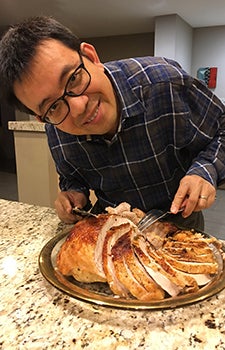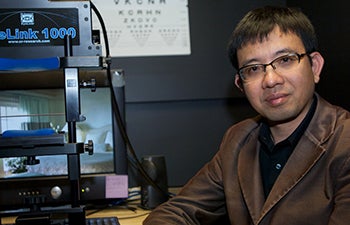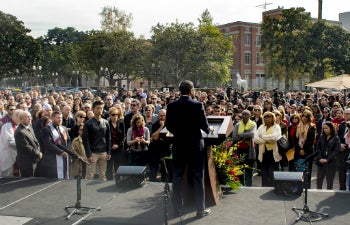
In Memoriam: Bosco Tjan, 50
Bosco Tjan, professor of psychology and co-director of the Dana and David Dornsife Cognitive Neuroimaging Center, has died. He was 50.
Tjan died after being stabbed by an assailant on Dec. 2, 2016, on USC’s University Park campus.
“Words cannot describe the tragedy of this senseless act of violence,” said USC Dornsife Dean Amber D. Miller. “Our USC community mourns the loss of Professor Bosco Tjan, and our heartfelt sympathy goes out to his family and loved ones.”
Tjan joined USC Dornsife in 2001, becoming co-director of the Dana and David Dornsife Cognitive Neuroimaging Center in 2011. He was a world-renowned expert on vision, particularly in how the brain recognizes shapes and scenes. He had recently received a $4 million grant with a team of researchers from the National Institutes of Health to study how blindness changes the brain. His ongoing research projects included image enhancement for people with impaired vision, indoor navigation aid for the blind and the visually impaired, and perception of visual speech.
“Bosco Tjan was a beloved member of our psychology faculty,” said Jo Ann Farver, professor and chair of psychology. “He was a dedicated, kind and patient teacher and mentor of graduate and undergraduate students. We will all especially miss his sense of humor, keen wit and brilliant mind.”
A major contribution
Irving Biederman, Harold Dornsife Chair in Neurosciences and professor of psychology and computer science, was a close friend and longtime colleague of Tjan’s. In a eulogy he delivered at a Dec. 5 memorial held on USC’s University Park campus, Biederman described Tjan as “a major contributor to vision science.”
“He tackled a wide range of problems, and everything he published was a paragon of beautiful design and rigorous methodology.”
Biederman said Tjan’s signature trait was his willingness to lend his impressive intellectual, technical and scholarly faculties to other people’s problems.
“People wanted to hear what Bosco would say about their work,” Biederman said. “His comments and criticisms were always phrased gently.” Moreover, Tjan’s input was given without cost; he expected nothing in return, Biederman explained.

Bosco Tjan was an excellent cook who loved to share the feasts he created — in this case the turkey he had roasted for this year’s Thanksgiving celebration. Photograph courtesy of Carissa Pang.
University Professor Antonio Damasio, David Dornsife Chair in Neuroscience and professor of psychology, philosophy, and neurology and director of the USC Dornsife Brain and Creativity Institute, and University Professor Hanna Damasio, Dana Dornsife Chair in Neuroscience, professor of psychology and neurology and co-director of the USC Dornsife Brain and Creativity Institute, also paid tribute to Tjan’s humble nature, describing him as “a man for all seasons.”
“He was a successful scientist, a technical wizard who could repair anything from a scanner to a car, a dedicated family man, and a generous colleague and teacher,” the Damasios wrote. “He was humble and giving, a tribute to the patron saint whose name he carried, Giovanni Bosco, a humble man who spent his life helping others.”
Speaking at the Dec. 5 memorial for Tjan, graduate student Helga Mazyar remembered how her adviser always went the extra mile. When she needed help on her neuroscience research, Tjan was there for her. When her car broke down, he offered names of mechanics and tips on how to follow up. And when she was having visa issues while traveling back to the U.S. that left her stuck overseas for three months, Tjan called the embassy and USC officials and followed up on her research through weekly video chats.
“Helping people in any possible way was his nature,” Mazyar said. “This leaves a hole in my heart and my life.”
“We all have many reasons to grieve for Bosco,” said Wendy Wood, Provost Professor of Psychology and Business and director of the Social Behavior Laboratory. “He was, quite simply, a really nice colleague who was easy to like and respect. But in addition, there’s his science. Without him, we lose unique understanding of visual impairments. Understanding that was helping people lead better lives. His absence is not easy to comprehend.”
An early aptitude for science and technology
Born on Jan. 21, 1966, in Beijing, Tjan was the elder son of Indonesian-born parents, both of whom had studied chemistry. Tjan’s mother, Thee-Niang Huang, was a chemical engineer and his father, Hing-Bing Tjan, was an academic before becoming the owner of the largest pigeon farm in Southern China. Tjan moved to Hong Kong — then a British colony — with his family in the early ’70s, where he rapidly learned to speak fluent Cantonese and English in addition to his native Mandarin.
As a child he was fascinated by machines and showed an early aptitude for science and technology. His widow, Carissa Pang, said that even at a young age, Tjan’s gift was evident.
“When Bosco was very young, his mother took him to the factory where she worked,” Pang said. “Although he was only 2 or 3 years old, he was able to understand the concept of ‘input-output’ and could tell her where to shut off the pipeline. His mom and many of her colleagues thought he was a genius when he was very young.”
That instinctive understanding of machines continued throughout his childhood.
“Even when Bosco was little he already knew a lot about anything mechanical and could explain something really technical in simplistic, easy-to-understand terms,” said his brother, Kokie Tjan. “Plus, he was really good at using tools and he loved fixing stuff. So whenever my cousins had a problem or needed something fixed, they all asked my brother first. There was no internet at the time, so instead our go-to response was, ‘Just ask Bosco.’”
A natural concern for others
Tjan completed his high school education at Aberdeen Technical School in Hong Kong, a Catholic boarding school where he developed the devout Christian faith that became the bedrock of his life. Tjan excelled in the school’s rigorous academic program and was at the top of his class.
At one time, Tjan had considered becoming a priest, Pang said. Although he pursued a career in science instead, Tjan continued to devote considerable time to studying Biblical verses and took a scholarly delight in trying to understand their historic meaning.
Tjan moved to the United States alone at age 18 to attend Texas Tech University in Lubbock, Texas, transferring later to the University of Kansas where he earned an undergraduate honors degree in computer science in 1987.

One of Bosco Tjan’s proudest achievements was the Dana and David Dornsife Cognitive Neuroimaging Center, which he co-directed and which helped found in 2004. Photo by Dietmar Quistorf.
He then went to the University of Minnesota in 1989, working as a research assistant in the departments of psychology and computer science before earning his Ph.D. in computer and information science in 1997.
At both institutions, he was very active in the Hong Kong Student Association, helping many students adjust to American life.
After obtaining his Ph.D., Tjan spent a year in Tübingen, Germany, as a postdoctoral research fellow at the Max-Planck Institute for Biological Cybernetics. There his research focused on behavioral and computational studies of 3-D object recognition, symmetry perception, scene recognition, haptic perception and virtual environments.
Tjan returned to the U.S. in 1998 and worked as a research associate at the NEC Research Institute in Princeton, N.J., until 2000 before joining USC Dornsife the following year.
A truly interdisciplinary scholar
Morteza Dehghani, assistant professor of psychology and computer science, described Tjan as a true interdisciplinary scholar whose loss leaves a huge hole, not only in the department and at the university level, but across academe.
“Bosco was a psychologist, Bosco was a computer scientist, Bosco was a physicist, and Bosco was a neuroscientist, and he was an expert in all of these fields. The fact that he spoke all these different languages — the language of psychologists and physicists and neuroscientists — meant that he was pivotal in facilitating cutting-edge interdisciplinary work. Essentially, Bosco was a centroid where fields connected to each other through him, and his loss leaves a void, not just in our hearts, but in the core of interdisciplinary research that may not be healed.”
Dehghani said Tjan was a rare Platonic academic. “He was not only a true scientist, someone who was really passionate about his work, but he was one of those rare people who you could reach out to for any problem, any issue, however mundane. He was always there for you.”
Committed to science — and helping others
Alumnus Christopher Purington managed Tjan’s laboratory. He said what always struck him most about Tjan was how he put 100 percent into everything he did.
“Bosco thought a lot about the problems of people with vision loss and spent his entire career investigating ways to solve those problems,” said Purington, who earned a bachelors degree in psychology at USC Dornsife in 2011. “He understood just how big of a difference even little improvements in vision made on someone’s daily life, and wanted to do everything in his power to make those improvements possible.”
“He was not someone who strove for personal glory or chased great recognition in life, he was someone who strove for the ideals of science and for incremental progress to make peoples’ lives better.”
Matthew Sachs, a doctoral student in brain and cognitive science, said Tjan’s personality compelled him to engage the vision scientist in conversation.
“Every time we spoke was another opportunity for me to glean a sense of how his wonderful mind worked and his unique perspective on the world. His intellectual curiosity and desire to continually question and search for answers were not only admirable, but traits that I too hope to cultivate in my process of becoming a scientist.”
A news junkie and NPR-fan who cared deeply about politics, Tjan was a keen astronomer and skier, as well. A devoted father, he was excited about his 9-year-old son Daniel’s progress on the slopes. “Bosco was very proud to be able to ski with him,” Pang said.
Tjan was also a foodie who loved to take his family out to try different restaurants and an accomplished cook who greatly enjoyed inviting people, even students he didn’t know well, home to partake of the feasts he created.
“He wanted them to celebrate together and not be by themselves. Everybody was welcome,” Pang said. “He had a good heart.”
Mourning for Tjan extends around the world

Faculty, students and staff gather to remember and honor Bosco Tjan during a Dec. 5 memorial in his honor on the University Park campus. Photo by Gus Ruelas.
Tjan was a popular and prolific speaker. He gave more than 140 conference presentations and more than 60 invited talks worldwide.
Biederman said that it had comes as no surprise to him that since Tjan’s death was announced he had been swamped with emails and texts from all over the world.
“I am, like so many of those who knew and loved him, in deep shock and mourning over this devastating tragedy. The quality of our daily lives at USC will surely be diminished by Bosco’s absence. But we need to remember and celebrate the joy that his life did bring to so many of us.”
Tjan taught five undergraduate and seven graduate courses at USC Dornsife. From 2010-13, he served as head of the Brain and Cognitive Science Area in the Department of Psychology. He also served on 17 university committees, including the Executive Committee of the Neuroscience Graduate Program (2006-present), the Dean’s Neuroscience Advisory Committee (2008-10) and the Admissions Committee, for which he served as chair twice, from 2008-10, and as co-chair from 2011 until his death. In 1999, he spent a year teaching at Rutgers University – Newark in Newark, N.J.
He was awarded the USC Neuroscience Graduate Forum Faculty Member of the Year in 2011.
Tjan published 47 peer-reviewed articles. He sat on the editorial board of the Journal of Vision and Scientific Reports and served as a consulting editor for Perception and Psychophysics.
He was a member of the Society of Neuroscience, Vision Sciences Society, Association for Research in Vision and Ophthalmology Psychonomic Society, the Honor Society in Computer Science Upsilon Pi Epsilon and the Honor Society Phi Eta Sigma.
Tjan is survived by his wife Carissa Pang; his son, Daniel Tjan; his brother, Kokie Tjan; and his mother, Thee-Niang Huang.
A GoFundMe campaign has been established online by the USC Dornsife Department of Psychology for those who wish to pay tribute to Tjan by making a donation to help support his wife and young son.